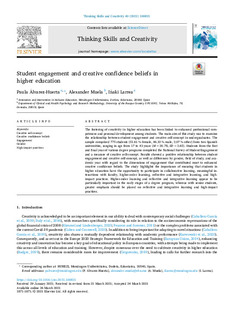| dc.rights.license | Attribution 4.0 International | * |
| dc.contributor.author | Alvarez-Huerta, Paula | |
| dc.contributor.author | Larrea, Inaki | |
| dc.contributor.other | Muela Aparicio, Alexander | |
| dc.date.accessioned | 2022-01-18T15:24:26Z | |
| dc.date.available | 2022-01-18T15:24:26Z | |
| dc.date.issued | 2021 | |
| dc.identifier.issn | 1871-1871 | en |
| dc.identifier.other | https://katalogoa.mondragon.edu/janium-bin/janium_login_opac.pl?find&ficha_no=163288 | en |
| dc.identifier.uri | https://hdl.handle.net/20.500.11984/5445 | |
| dc.description.abstract | The fostering of creativity in higher education has been linked to enhanced professional com-petences and personal development among students. The main aim of this study was to examine the relationship between student engagement and creative self-concept in undergraduates. The sample comprised 775 students (51.61 % female, 46.32 % male, 2.07 % other) from two Spanish universities, ranging in age from 17 to 43 years (M = 20.78, SD = 2.65). Students from the first and final year of various degree programs completed the National Survey of Student Engagement and a measure of creative self-concept. Results showed a positive relationship between student engagement and creative self-concept, as well as differences by gender, field of study, and aca-demic year with regard to the dimensions of engagement that contributed most to enhanced creative confidence beliefs. The study highlights the importance of ensuring that students in higher education have the opportunity to participate in collaborative learning, meaningful in-teractions with faculty, higher-order learning, reflective and integrative learning, and high- impact practices. Higher-order learning and reflective and integrative learning appear to be particularly important in the early stages of a degree program, whereas with senior students, greater emphasis should be placed on reflective and integrative learning and high-impact practices. | en |
| dc.description.sponsorship | Gipuzkoako Foru Aldundia | eu |
| dc.language.iso | eng | en |
| dc.publisher | Elsevier | en |
| dc.rights | © 2021 Elsevier Ltd | en |
| dc.rights.uri | http://creativecommons.org/licenses/by/4.0/ | * |
| dc.subject | Creative self-concept | en |
| dc.subject | Creative confidence beliefs | en |
| dc.subject | Engagement | en |
| dc.subject | Gender | en |
| dc.subject | High-impact practices | en |
| dc.title | Student engagement and creative confidence beliefs in higher education | en |
| dcterms.accessRights | http://purl.org/coar/access_right/c_f1cf | en |
| dcterms.source | Thinking Skills and Creativity | en |
| local.contributor.group | Berrikuntza eta esku-hartzea hezkuntza inklusiboan | eu |
| local.description.peerreviewed | true | en |
| local.identifier.doi | https://doi.org/10.1016/j.tsc.2021.100821 | en |
| local.embargo.enddate | 2023-03-26 | |
| local.contributor.otherinstitution | https://ror.org/000xsnr85 | eu |
| local.source.details | Vol. 40, article 100821 | en |
| oaire.format.mimetype | application/pdf | |
| oaire.file | $DSPACE\assetstore | |
| oaire.resourceType | http://purl.org/coar/resource_type/c_6501 | en |
| oaire.version | http://purl.org/coar/version/c_ab4af688f83e57aa | en |








